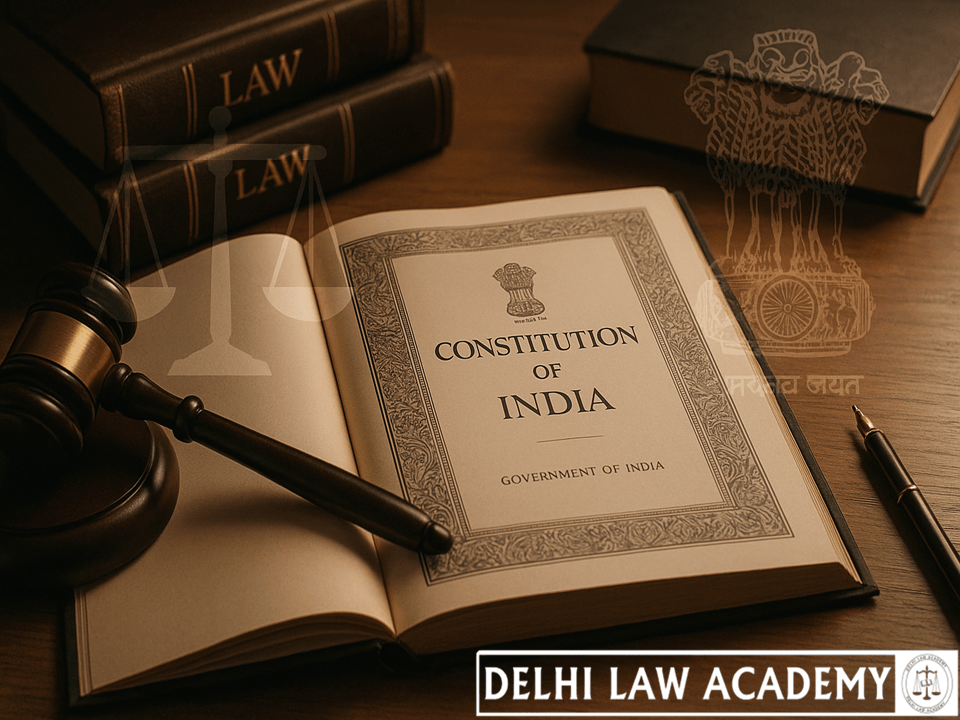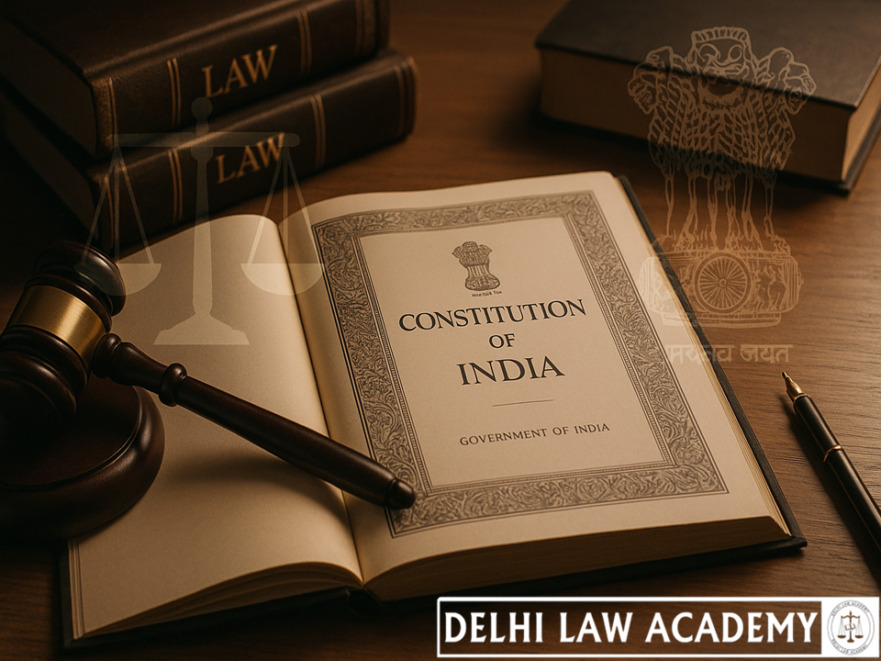
🇮🇳 UNION EXECUTIVE – Detailed Notes
Articles 52–71 of the Indian Constitution | Delhi Law Academy Jaipur
📘 Topic Overview
Delhi Law Academy Jaipur presents below for aspirants of RJS, DJS, PCS(J) and other Judicial Services throughout India a short Note on the Union Executive.
****************** UNION EXECUTIVE Article 52 • There shall be a President of India Article 53 Executive power of Union • Executive power of Union shall vest in President o to be exercised by him directly or through subordinate officers o to be exercised in accordance with this Constitution • Supreme command of defence forces shall vest in President Article 54 Election of President • Electoral college for election of President consists of o Elected members of both Houses of Parliament o Elected members of State Legislative Assemblies including Delhi and Puducherry Article 55 Manner of Election • Number of votes of MLA of a State = Population of State / total number of elected MLAs o Further divided by 1000 • Number of votes of every MP = Total number of votes of all MLAs / total number of elected MPs ‘Population’ in this Article means o Population as per 1971 census Population remains frozen at this level o till a census beyond 2026 Article 56 Term of Office Normal term • 5 years from the date of entering office Shorter term • Removal by impeachment • Resignation o to be addressed to Vice-President o Vice-President will communicate it to Speaker of Lok Sabha Article 57 Eligibility for re-election • Re-election is possible any number of times Article 58 Qualifications • Should be a citizen of India • Should be at least 35 years of age • Should be qualified to be elected to Lok Sabha • Should not hold any office of profit under govt or any authority under govt control Following offices are not considered as ‘office of profit’: o President o Vice President o Governor o Union Minister o Minister of a State Article 59 Conditions of President’s office • Shall not be an MP or MLA • Shall not hold any other office of profit • Shall be entitled to rent free official residence • Shall be entitled to such emoluments and allowances as determined by Parliament Article 60 Oath of office • Oath or affirmation o in presence of Chief Justice of India Content • “To preserve, protect and defend the Constitution and the law" • "To be in the service and well-being of the people of India” Article 61 Impeachment Ground: • Violation of Constitution Procedure: Step 1: Preferring of charge • By either House of Parliament • A 14-days prior notice signed by not less than ¼th members to be given • Charge is preferred by passing a resolution o with a special majority of not less than two-thirds of the total membership of the House Step 2: Investigation of charge • By the other House, to be called the Investigating House • President has a right to appear and to be represented during investigation • If the investigating House passes a resolution o by the same special majority sustaining the charge • the President stands removed Article 62 Time of holding election • Election for President to be held o before expiration of the 5-year term • In case of death, resignation or removal o election to be held within 6 months Article 63 Vice-President of India • There shall be a Vice-President of India Article 64 Functions of Vice-President • Vice-President is ex-officio Chairman of Council of States o except when acting as President • Vice-President shall not hold any other office of profit Article 65 Vice-President to act as President • Vice-President to act as President o in case of President’s death, resignation or removal • Vice-President to discharge functions of President o in case of President’s inability to do so due to absence, illness etc. • In this period o Vice-President to have all powers, immunities and emoluments of President Article 66 Election of Vice-President • Electoral college for election of Vice-President consists of o All members of both Houses of Parliament Qualifications of Vice-President • Should be a Citizen of India • Should be at least 35 years of age • Should be qualified to be elected to RS • Should not hold any office of profit under govt or any authority under govt control ‘Office of profit’ o to have the same meaning as in the case of President Article 67 Term of Office of Vice-President Normal Term • 5 years Removal • By a resolution of Rajya Sabha o passed by a majority of all the then members of RS and • agreed by Lok Sabha o by simple majority Article 68 Time of holding election of Vice-President • Election to be held o before the expiration of the 5-year term • In case of death, resignation or removal o election to be held as soon as possible Article 69 Oath of office • Oath or affirmation o before the President Content • "Allegiance to the Constitution as by law established" Article 70 Other contingencies • Parliament may make provision o for discharge of functions of President o in any contingency not provided for Article 71 Election disputes • Disputes relating to election of President and Vice-President o to be inquired into and decided by the Supreme Court • Supreme Court decision to be final ***************
📚 For complete Constitution notes & Judiciary preparation materials, visit Delhi Law Academy
📘 Stay Ahead with Delhi Law Academy!
Get access to free monthly current affairs, read our insightful blogs,
and explore free study resources prepared by experts at DLA Jaipur. 🚀
💬 FAQs — Union Executive (Articles 52–71)
Common long-tail questions answered for RJS, DJS & PCS(J) aspirants about the President and Vice-President of India — election, powers, and impeachment under the Constitution.
All executive powers of the Union are vested in the President and are exercised either directly or through subordinate officers in accordance with the Constitution.
Search phrase: “Who is the head of Union Executive Article 52 explained”
Votes are assigned based on the population-to-representative ratio as per the 1971 census (Articles 54 and 55).
Search phrase: “Election of President of India Article 54 55 procedure explained”
The process involves two steps:
- Step 1: Either House of Parliament can initiate the process with a special majority (⅔ of total membership) after a 14-day notice.
- Step 2: The other House investigates the charge; if upheld by the same special majority, the President stands removed.
Search phrase: “Impeachment procedure of President Article 61 step by step”
- Be a citizen of India
- Be at least 35 years of age
- Be qualified to be elected as a member of the Lok Sabha
- Not hold any office of profit under the government
Offices such as President, Vice-President, Governor, and Ministers are exempted from “office of profit.”
Search phrase: “Qualifications of President of India Article 58 detailed list”
Under Article 64, he serves as the ex-officio Chairman of the Rajya Sabha and acts as the President in the latter’s absence, death, or resignation.
Search phrase: “Vice President election and functions Article 63 to 65 explained”
The Supreme Court’s decision in these matters is final and binding.
Search phrase: “Election disputes of President and Vice-President Article 71”
📚 For detailed notes on the Constitution & Judiciary exams, visit
Delhi Law Academy
Contact us
📍 Delhi Law Academy – Jaipur Branch
6C, Tower 2, Coaching Hub, Pratap Nagar, Jaipur – 302033
📞 Phone:
+91 9911916552
+91 8447285606
✉️ Email:
contactus@delhilawacademy.com

